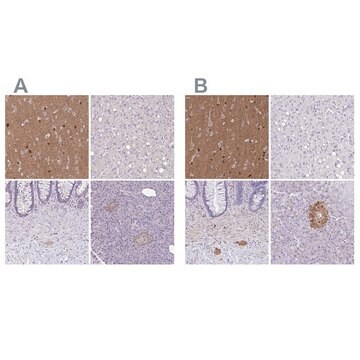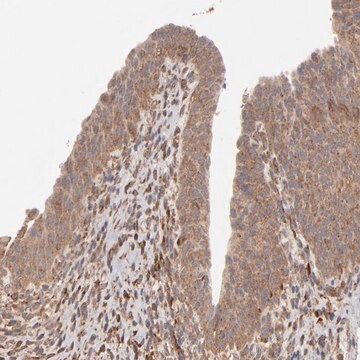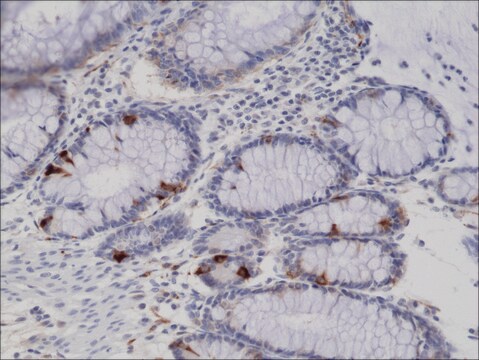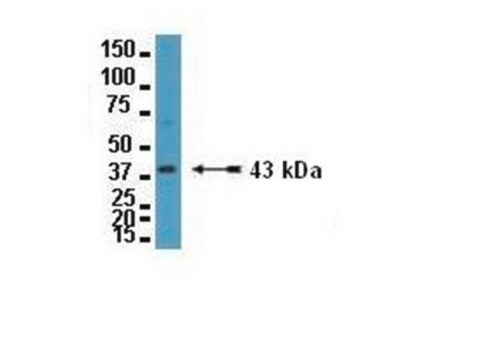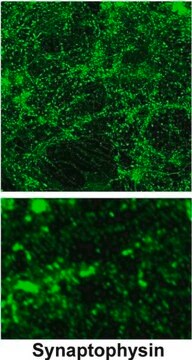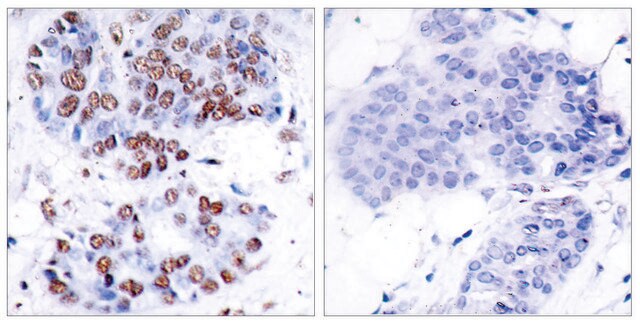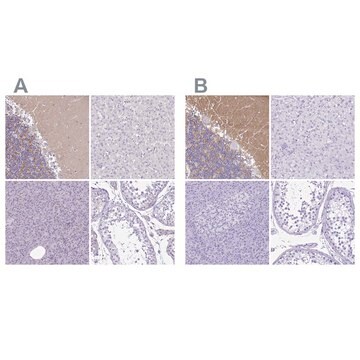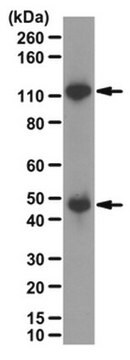추천 제품
생물학적 소스
mouse
Quality Level
항체 형태
purified immunoglobulin
항체 생산 유형
primary antibodies
클론
10C11.1, monoclonal
종 반응성
human, mouse
기술
immunohistochemistry: suitable (paraffin)
western blot: suitable
동형
IgG1κ
NCBI 수납 번호
UniProt 수납 번호
배송 상태
wet ice
타겟 번역 후 변형
unmodified
유전자 정보
human ... SYT4(6860)
일반 설명
Synaptotagmin-4 (UniProt Q9H2B2; also known as Synaptotagmin IV, SytIV) is encoded by the SYT4 (also known as KIAA1342) gene (Gene ID 6860) in human. The mammalian synaptotagmin family is comprised of 17 members. While most of them are predominantly function in the cetnral nervous system (CNS), some are involved in the vesicular functions of endocrine cells and glucose-transport metabolic cells. Synaptotagmin-4 is an inducible member detectable only in the brain and the neuroendocrine system. Unlike other family members, synaptotagmin-4 does not bind calcium and does not medidate calcium-induced exocytosis. Instead, synaptotagmin-4 is shown to play a neuroendocrine role in inhibiting exocytotic activities in the posterior pituitary and in cultured PC12 cells. Synaptotagmin-4 is expressed most abundantly in oxytocin neurons of the hypothalamus, where it negatively regulates oxytocin exocytosis. Dietary obesity is associated with increased vesicle binding of synaptotagmin-4 and decreased oxytocin release. Normalizing oxytocin release via Synaptotagmin-4 inhibition prevents against dietary obesity under chronic nutritional excess. Human synaptotagmin-4 consists of a vesiclular domain (a.a. 1-16), a transmembrane segment (a.a. 17-37),and a large cytoplasmic domain (a.a. 38-425).
특이성
Clone 10C11.1 targets a cytoplasmic epitope present in both human spliced isoforms reported by UniProt (Q9H2B2).
면역원
Epitope: Cytoplasmic domain.
GST-tagged recombinant human Synaptotagmin-4 cytoplasmic domain fragment.
애플리케이션
Immunohistochemistry Analysis: A 1:50 dilution from a representative lot detected Synaptotagmin-4 in human kidney, skeletal muscle, and pancreas tissue sections.
Research Category
Neuroscience
Neuroscience
Research Sub Category
Vesicular Trafficking
Vesicular Trafficking
This Anti-Synaptotagmin-4 Antibody, clone 10C11.1 is validated for use in Western Blotting, Immunohistochemistry (Paraffin) for the detection of Synaptotagmin-4.
품질
Evaluated by Western Blotting in mouse cerebellum tissue lysate.
Western Blotting Analysis: 1.0 µg/mL of this antibody detected Synaptotagmin-4 in 10 µg of mouse cerebellum tissue lysate.
Western Blotting Analysis: 1.0 µg/mL of this antibody detected Synaptotagmin-4 in 10 µg of mouse cerebellum tissue lysate.
표적 설명
~48 kDa observed. 47.96/46.06 kDa (human isoform 1/2) and 47.66 kDa (mouse) calculated.
물리적 형태
Format: Purified
Protein G purified.
Purified mouse monoclonal IgG1κ antibody in buffer containing 0.1 M Tris-Glycine (pH 7.4), 150 mM NaCl with 0.05% sodium azide.
저장 및 안정성
Stable for 1 year at 2-8°C from date of receipt.
기타 정보
Concentration: Please refer to lot specific datasheet.
면책조항
Unless otherwise stated in our catalog or other company documentation accompanying the product(s), our products are intended for research use only and are not to be used for any other purpose, which includes but is not limited to, unauthorized commercial uses, in vitro diagnostic uses, ex vivo or in vivo therapeutic uses or any type of consumption or application to humans or animals.
적합한 제품을 찾을 수 없으신가요?
당사의 제품 선택기 도구.을(를) 시도해 보세요.
Storage Class Code
12 - Non Combustible Liquids
WGK
WGK 1
시험 성적서(COA)
제품의 로트/배치 번호를 입력하여 시험 성적서(COA)을 검색하십시오. 로트 및 배치 번호는 제품 라벨에 있는 ‘로트’ 또는 ‘배치’라는 용어 뒤에서 찾을 수 있습니다.
Yazi D Ke et al.
The Journal of biological chemistry, 294(38), 14149-14162 (2019-08-02)
The microtubule-associated protein tau undergoes aberrant modification resulting in insoluble brain deposits in various neurodegenerative diseases, including frontotemporal dementia (FTD), progressive supranuclear palsy, and corticobasal degeneration. Tau aggregates can form in different cell types of the central nervous system (CNS)
자사의 과학자팀은 생명 과학, 재료 과학, 화학 합성, 크로마토그래피, 분석 및 기타 많은 영역을 포함한 모든 과학 분야에 경험이 있습니다..
고객지원팀으로 연락바랍니다.
